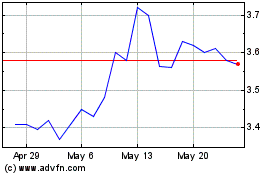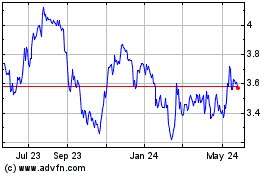By Anna Hirtenstein
French retailer Carrefour SA recently began its first share
buyback in a decade, spurred by strong cash flow and a belief that
the economic recovery is under way. And it isn't alone.
This year has seen a slew of companies in Europe putting forward
share repurchase programs, including luxury house LVMH Moët
Hennessy Louis Vuitton SE, personal care company L'Oréal SA and oil
major Eni SpA. Around 56 firms have released plans to buy their own
shares so far in 2021, the most for the comparable period in three
years, according to an analysis by Société Générale SA.
The trend signals growing confidence among corporate leaders and
marks a pivot in strategy in a region that has traditionally
favored dividends. The pandemic may have accelerated the shift
toward rewarding shareholders through buybacks, at least
temporarily, according to analysts at the French bank.
As lockdowns and social distancing hit earnings, many companies
cut or canceled dividend policies last year. For some industries,
such as banking, regulators required it. European firms issued
close to EUR1 trillion of debt last year, equivalent to $1.2
trillion, data from Dealogic showed, building up cash cushions to
weather the storm. Now that the recovery appears to have some
momentum, many are unwinding these emergency measures and preparing
payouts to shareholders.
"In 2020, a lot of companies were forced to cut dividends, which
is very painful," said Roland Kaloyan, head of European equity
strategy at Société Générale. "Buybacks, it's a way to return cash
to your shareholders, if you don't want to commit too much and too
soon to higher dividends in the coming quarters."
Many European companies have reported a growth rebound, with the
most positive earnings surprises in the first quarter since at
least 2008, according to an analysis from Goldman Sachs Group.
Firms upwardly revised their guidance for 2021 earnings per share
by an average of 10.6% so far this year, the most since at least
2013, the bank said.
Some analysts were already expecting the region's equity market
to outperform U.S. stocks this year, because European stocks
haven't recovered as strongly yet and are largely beginning from
lower valuations. A wave of buybacks could boost that effect,
analysts said.
Investors are cautioning companies to take it easy and not rush
into dividend policies, which are generally expected to be a
long-term commitment.
"It's prudent to do buybacks now rather than ramping up
dividends because you have extra cash at the moment," said Chi
Chan, a European equities portfolio manager at Federated Hermes.
"We don't know how the world is going to shake out
post-pandemic."
Share buybacks are common in the U.S. and often seen as a driver
of equity market performance. That is because earnings per share
increase as a company reduces the number of shares outstanding. The
S&P 500 rose 237% in the decade through to 2020, compared with
a 57% rise for the Stoxx Europe 600.
"In the U.S. in recent years, equity supply has been shrinking.
There have been more share buybacks; the corporate sector has been
a big buyer, " said Sharon Bell, a managing director with a focus
on European equity strategy at Goldman Sachs. "This can be a very
important influence on market prices for sure."
She added, "In Europe, given all these announcements, I would
expect some equity market shrinkage this year."
Buybacks are also surging in the U.S., with companies such as
JPMorgan Chase & Co., Apple Inc., Netflix Inc. and Lockheed
Martin Corp. announcing share repurchase plans in their
first-quarter results. Goldman Sachs is forecasting a 35% rise in
buybacks this year by S&P 500 companies and another 5% in
2022.
Société Générale is projecting European companies will spend
around EUR150 billion on share repurchases next year. That would be
a 25% increase from the average annual spend in the five years
before the pandemic. The buyback yield, a gauge of payouts to
shareholders, is expected to rise to the highest level in over a
decade. The following year the bank expects to see EUR190 billion
spent, propelling the yield to its highest since 2008.
A substantial rise in share repurchases could attract more
foreign investors to Europe, Mr. Kaloyan said. Net capital flows
into funds that invest in European equities rose to $112.2 billion
in March, the first inflow after six consecutive months of
outflows, according to data from Morningstar.
Shaunak Mazumder, a global equities portfolio manager at Legal
& General Investment Management, has recently increased his
allocation to European stocks.
"There is definitely a signaling effect you get from buybacks,
because you know that there's going to be an active buyer of the
stock," Mr. Mazumder said.
To be sure, this shift to buybacks may not be a long-term change
for European companies, due to the prevalence of income-focused
investors in the region such as insurers and pension funds.
Persistently low bond yields also mean that demand for steady
dividend payouts remains high.
Europe is likely to see more buybacks over the next few years,
"but I don't think this means that companies will suddenly renege
on dividends, " said Goldman's Ms. Bell. "This will be in
addition."
Write to Anna Hirtenstein at anna.hirtenstein@wsj.com
(END) Dow Jones Newswires
May 19, 2021 05:44 ET (09:44 GMT)
Copyright (c) 2021 Dow Jones & Company, Inc.
Carrefour (PK) (USOTC:CRRFY)
Historical Stock Chart
From Nov 2024 to Dec 2024

Carrefour (PK) (USOTC:CRRFY)
Historical Stock Chart
From Dec 2023 to Dec 2024
